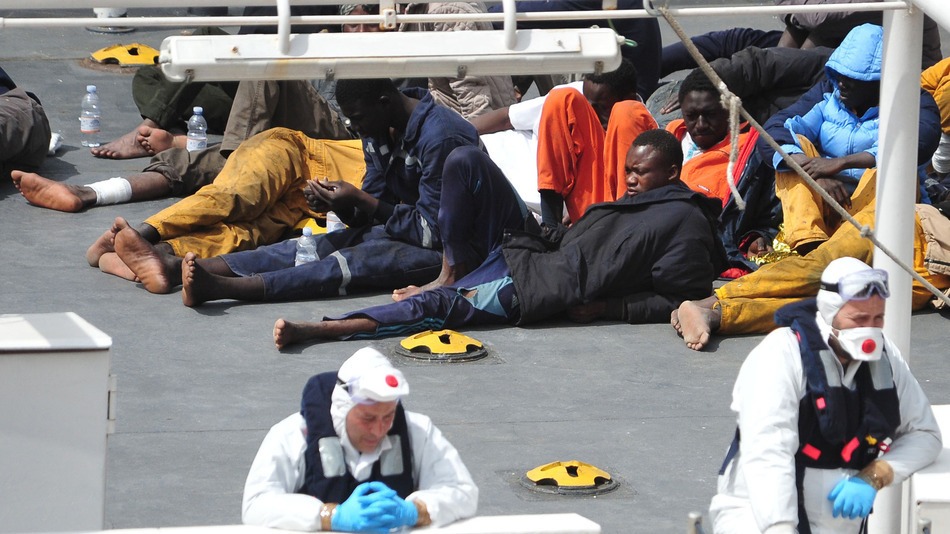
Survivors of the smuggler's boat that overturned off the coasts of Libya lie on the deck of the Italian Coast Guard ship Bruno Gregoretti, in Valletta's Grand Harbour, Monday, April 20 2015.
As many as 850 people are believed to have drowned after a boat packed with migrants trying to reach Europe capsized off the coast of Libya on Sunday, making it the worst disaster ever recorded in the Mediterranean Sea.
On Tuesday, spokesman for the Geneva-based U.N. High Commissioner for Refugees, Adrian Edwards, said the agency came to the devastating conclusion after interviewing most of the 28 survivors.
This [is the] deadliest incident in the Mediterranean that we have recorded," Edwards told the AP.
On Tuesday morning, Italian police arrested 27-year-old Tunisian Mohammed Ali Malek, believed to be the captain of the vessel, and Syrian national Mahmud Bikhit, 25, who were among the group of survivors who arrived in the Sicilian port of Catania on Monday evening. The two men were charged with human trafficking, and the captain was also charged with reckless multiple homicide in relation to the sinking.
"Two people are currently held in custody following the testimony of survivors: the captain, of Tunisian origins, and a Syrian male national," Catania prosecutor Giovanni Salvi told reporters.
"The remaining 25 migrants are free. They will be identified following immediate care and are expected to request asylum."
According to police, two particular incidents caused the boat to capsize: the captain mistakenly ramming his boat into the Portuguese-flagged merchant ship that had come to its rescue, and the migrants shifting position on the boat, which was already off balance due to the collision.
About 350 of those aboard were believed to have been Eritreans, and the other migrants were likely from Syria, Somalia, Sierra Leone, Mali, Senegal, Gambia, Ivory Coast, Ethiopia and Bangladesh.
Officials for the United Nations refugee agency (UNHCR) and the International Organisation for Migration (IOM) reported that many of those dead were children between the ages of 10 and 12, and those who survived are reportedly "shocked" but in "overall good condition."
"[The] migrants looked exhausted, fragile, astonished to see so many people waiting for them. They will need psychological support. They are receiving food and water," said Carlotta Sami, spokeswoman for the UNHCR.
"They are very distressed. They could express themselves but most of them didn't say much and you can't push them too much in these circumstances ... They were all young. The average age 25, I would say," an aid worker later told the Guardian.
Meanwhile, speaking after the Regina Coeli prayer to thousands of people in St. Peter's Square on Sunday, Pope Francis made a "heartfelt appeal" for more to be done to help the migrants, who fled their respective countries in hopes of finding a better life.
"(The migrants) are men and women like us, our brothers seeking a better life, starving, persecuted, wounded, exploited, victims of war. They were looking for a better life," he said.
"Faced with such a tragedy, I express my most heartfelt pain and promise to remember the victims and their families in prayer...I make a heartfelt appeal to the international community to react decisively and quickly to see to it that such tragedies are not repeated," the pontiff added.
Last year, 3,500 migrants drowned attempting the crossing. In April 2015, an estimated 1,300 migrants have drowned in the Mediterranean, taking the year's death toll to at least 1,776.














